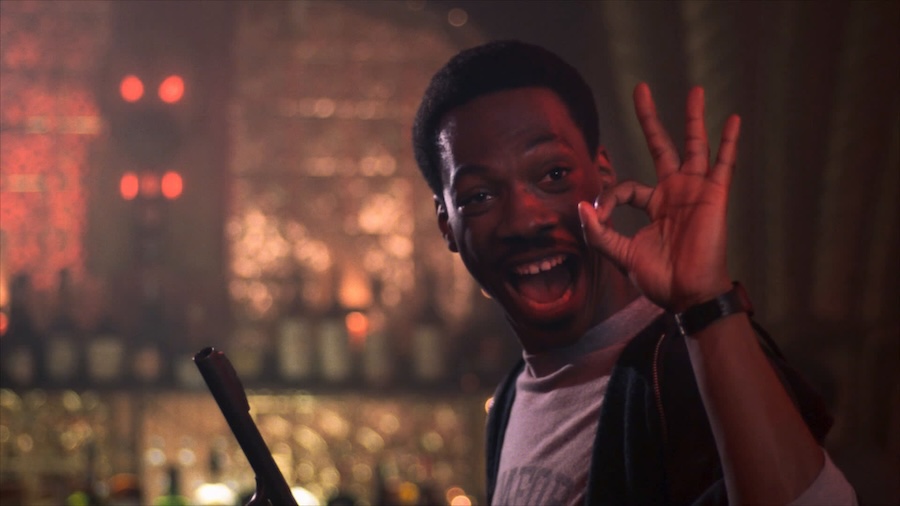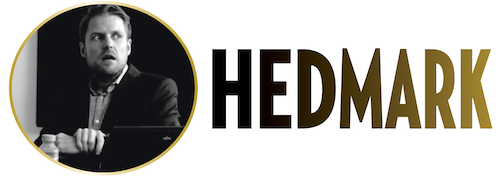
THE HEAT IS ON!

For decades, there were rumors about a fourth Beverly Hills Cop movie being planned and I don’t think anyone greeted the news with enthusiasm. But there was definitely a time when Eddie Murphy was sitting on top of the world, as Rolling Stone Magazine once put it. In 1984, Murphy was already a movie star thanks to the success of 48HRS. (1982) and Trading Places (1983); Beverly Hills Cop became his third hit and by far his biggest. The film also pretty much defined the concept of action-comedies for years to come.
An undercover cop in Detroit
When we first meet Axel Foley (Murphy), he’s working as an undercover cop in Detroit, great at his job but constantly finding new ways of landing himself in trouble. When an old friend of his, Mikey (James Russo), comes to town for a visit, a night out ends tragically when Mikey is murdered in cold blood. Axel’s boss tells him to stay out of the investigation, but he takes some time off and goes to Beverly Hills where Mikey worked for Victor Maitland (Steven Berkoff), an art dealer.
Axel visits Maitland in his office to learn more about what Mikey was doing for him, but is thrown out by Maitland’s thugs and promptly arrested by the Beverly Hills police department. Axel is impressed by the clean squad cars and the polite manners of the police officers… but refuses to heed any warnings regarding Maitland.
Not much blood but quite a body count
Murphy’s first scene clearly establishes him as the star of the film. He never stops talking and he knows how to exploit white people’s fear of being accused of racism; you can even tell from his eyes that he knows that he’s full of shit but as long as he doesn’t stop talking no one will notice. Murphy is hilarious and particularly good together with Ashton and Reinhold, two significantly more conservative cops who are constantly the butt of Axel’s jokes; the latter has a lot of charm as the enthusiastic, innocent part of the duo.
Perhaps not the brightest part of the script, but we are nonetheless instantly committed to Axel’s quest.
As for laughs, Bronson Pinchot also does his part as a gay art gallery worker whose accent is so thick that he’s even upstaging Murphy in his scenes (“Achwell?”). The story is as simple as they come; there’s no doubt that Maitland (a scenery-chewing Berkoff) is a murderous villain and in his first encounter with Axel he does his best to convince him of that fact. Hardly a smart move, but the Beverly Hills authorities are too dumb to listen to our hero. Perhaps not the brightest part of the script, but we are nonetheless instantly committed to Axel’s quest and the escalating war between him and Maitland is exciting, ending in a violent shootout at the villain’s swank home.
There isn’t much blood in the film, but still quite a body count. Harold Faltermeyer’s electronic score (and particularly his terrific “Axel F” theme) is just as perfect an accompaniment as the unusually successful pop soundtrack that makes great use of songs by Glenn Frey, Patti LaBelle and the Pointer Sisters. Those tunes were all major hits.
Great movies can come out of stressful situations. This project, though, had been discussed for many years until director Martin Brest took the helm. The last film he had made was in 1979, so it had been a while. Together with Murphy, he made it work and as a genre piece it is still a role model that young directors should be required to study.
Beverly Hills Cop 1984-U.S. 105 min. Color. Produced by Don Simpson, Jerry Bruckheimer. Directed by Martin Brest. Screenplay: Daniel Petrie, Jr. Music: Harold Faltermeyer. Songs: “New Attitude” (performed by Patti LaBelle), “The Heat Is On” (performed by Glenn Frey). Cast: Eddie Murphy (Axel Foley), Judge Reinhold (Billy Rosewood), John Ashton (John Taggart), Lisa Eilbacher, Ronny Cox, Steven Berkoff, Paul Reiser, Jonathan Banks… Damon Wayans.
Trivia: Sylvester Stallone, Harrison Ford and Mickey Rourke were considered for the part of Axel Foley; David Cronenberg and Martin Scorsese for directing duties. Followed by three sequels, starting with Beverly Hills Cop II (1987).
Quote: “Don’t you think I know that if I was some hotshot from out of town that pulled inside here and you guys made a reservation mistake, I’d be the first one to get a room and I’d be upstairs relaxing right now. But I’m not some hotshot from out of town, I’m a small reporter from Rolling Stone magazine that’s in town to do an exclusive interview with Michael Jackson that’s gonna be picked up by every major magazine in the country. I was gonna call the article ‘Michael Jackson Is Sitting On Top of the World,’ but now I think I might as well just call it ‘Michael Jackson Can Sit On Top of the World Just As Long As He Doesn’t Sit in the Beverly Palm Hotel ‘Cause There’s No Niggers Allowed in There!’” (Murphy trying to get a hotel room)
Last word: “I’m a comedian who got into movies, so I don’t really think of myself as an actor. I started out as a stand-up comedian. And that’s what I’m most comfortable doing. Making movies is time-consuming and it’s boring. You spend most of your time waiting between takes. It’s like a big machine that moves slowly. And you have to work in what you do with what somebody else is doing. It all has to fit together. Now that’s cool something. Like in the Cop movies, Judge [Reinhold] and John [Ashton] and I were comfortable improvising, and it took off somewhere. But that doesn’t always happen. When I’m doing stand-up, it’s just me depending on me. I know how to go out there and make people laugh.” (Murphy, Interview Magazine)
